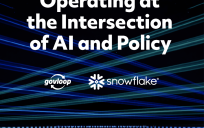Introducing AI Into Federal Agency Operations
In today’s fast-paced world, federal agencies face increasing pressure to streamline operations and deliver efficient services to citizens. Traditional methods often fall short, leading to bottlenecks, delays and inefficiencies. However, with the advent of artificial intelligence (AI), there’s a transformative opportunity to revolutionize how these agencies operate.

Understanding the Power of AI in Process Improvement
AI isn’t just a buzzword; it’s a game-changer for federal agencies seeking to enhance their operations. By harnessing the power of AI, agencies can analyze vast amounts of data, identify patterns and optimize processes in ways that were once unimaginable.
- Data Analysis: AI algorithms can sift through mountains of data, extracting valuable insights and identifying inefficiencies.
- Predictive Analytics: By leveraging predictive analytics, agencies can anticipate future trends and proactively address potential issues before they escalate.
- Automation: AI-driven automation can streamline repetitive tasks, freeing up human resources to focus on more strategic initiatives.
- Personalization: Tailoring services to individual needs becomes more feasible with AI, leading to higher citizen satisfaction and engagement.
Case Studies: AI Success Stories in Federal Agencies
- IRS: The Internal Revenue Service (IRS) implemented AI-powered chatbots to assist taxpayers with inquiries, significantly reducing call waiting times and improving overall customer satisfaction.
- FDA: The Food and Drug Administration (FDA) utilized AI algorithms to expedite the drug approval process, ensuring that life-saving medications reach patients faster while maintaining safety standards.
- VA: The Department of Veterans Affairs (VA) deployed AI-powered systems to streamline the claims processing workflow, reducing backlog and improving veteran access to benefits.
Overcoming Challenges and Ensuring Success
While the benefits of AI in federal agency operations are evident, there are challenges to navigate:
- Data Security: Safeguarding sensitive data is paramount. Agencies must implement robust security measures to protect against breaches and ensure compliance with regulations.
- Ethical Considerations: AI decisions must be transparent and ethical. Agencies must address concerns about bias and ensure accountability in AI-driven processes.
- Skills Gap: Building AI capabilities requires specialized skills. Agencies must invest in training and upskilling their workforce to leverage AI effectively.
Looking Ahead: The Future of AI in Federal Agencies
As technology continues to evolve, the potential for AI to revolutionize federal agency operations is limitless. By embracing innovation and fostering collaboration, agencies can drive continuous improvement and deliver better outcomes for citizens.
Conclusion: Embracing the AI Revolution
In conclusion, AI holds tremendous promise for enhancing process improvement and efficiency in federal agencies. By harnessing the power of AI-driven insights, agencies can overcome challenges, optimize operations and, ultimately, better serve the public.
As we embark on this journey of digital transformation, let’s embrace the AI revolution and unlock a future where federal agencies operate at peak efficiency, delivering value with every interaction.
(For insight into a meeting with top AI cybersecurity leaders and the need for an AI policy, checkout this podcast.)
Max Aulakh leads Ignyte Assurance Platform as the Managing Director focused on helping organizations cut through cyber security challenges. Max is a former U.S Air Force data security & compliance officer. As a Data Security and Compliance Leader, Max has implemented security strategies working directly with CxOs of global firms.
His latest work focuses on meeting high assurance standards involving federal cloud computing. He has also successfully guided Ignyte through the 3PAO, management of Air Force led Cooperative R&D Agreement (CRADA) and now helps other organizations navigate their FedRAMP challenges.
Max graduated with a Bachelors from Wright State University, Computer Science from American Military University and Criminal Justice Associates from Community College of the Air Force. Education is supplemented by several industry credentials: PMP, Certified Scrum Master, CISSP, and graduated from AMU with an Associate’s in General Studies — Computer Science in 2008 and Bachelor’s in Information Systems Security in 2009.





Leave a Reply
You must be logged in to post a comment.